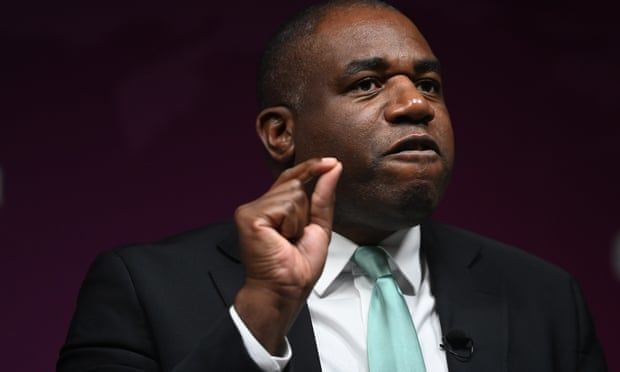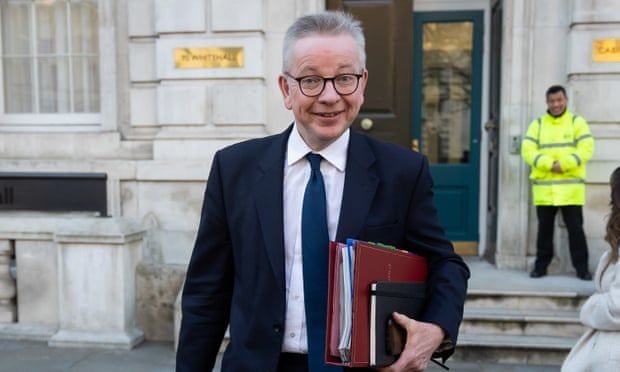
Revealed: secret cross-party summit held to confront failings of Brexit
An extraordinary cross-party summit bringing together leading leavers and remainers – including Michael Gove and senior members of Keir Starmer’s shadow cabinet – has been held in high secrecy to address the failings of Brexit and how to remedy them in the national interest, the Observer can reveal.
The two-day gathering of some of the country’s most senior Labour and Tory politicians from both sides of the Brexit debate, together with diplomats, defence experts and the heads of some of the biggest businesses and banks, was held at the historic Ditchley Park retreat in Oxfordshire on Thursday afternoon and evening, and on Friday.
Documents from the meeting, obtained by the Observer, describe it as a “private discussion” under the title: “How can we make Brexit work better with our neighbours in Europe?”
Those in attendance from the pro-Brexit side included the former Tory party leader Michael Howard, former Tory chancellor Norman Lamont and former Labour Europe minister Gisela Stuart, one of the leading figures of the leave campaign.
Among the prominent remainer politicians present were shadow foreign secretary David Lammy, shadow defence secretary John Healey and the former European commissioner and Labour cabinet minister Peter Mandelson, who acted as chairman. From the Tory remainer camp, the ex-cabinet minister and long-serving minister for Europe, David Lidington, attended.
 Labour’s David Lammy is understood to have attended the meeting.
Labour’s David Lammy is understood to have attended the meeting.
A confidential introductory statement for those at the meeting acknowledged that there was now a view among “some at least, that so far the UK has not yet found its way forward outside the EU” with Brexit “acting as a drag on our growth and inhibiting the UK’s potential”.
A source who was there said it was a “constructive meeting” that addressed the problems and opportunities of Brexit but which dwelt heavily on the economic downside to the UK economy at a time of global instability and rising energy prices.
“The main thrust of it was that Britain is losing out, that Brexit it not delivering, our economy is in a weak position,” said the source. “It was about moving on from leave and remain, and what are the issues we now have to face, and how can we get into the best position in order to have a conversation with the EU about changes to the UK-EU trade and cooperation agreement when that happens?”
Gove, who co-led the Vote Leave campaign in 2016 with Boris Johnson and Stuart, is understood to have made regular contributions including opening an informal conversation on Thursday night, with a source saying he was very “honest” about the shortcomings of Brexit, while still believing it would prove the right decision in the long run.
In terms that will anger ardent Tory Brexiters, the summit documents said that while on the European side there was “little interest in further wrangling over Brexit and little time being devoted to the relationship with the UK … there is also clear European as well as British strategic interest in a productive and closer relationship.”
Stating that “rejoining the EU will not be on the agenda”, the summit papers nonetheless stressed that the EU and UK “have shared interests on containing Russian aggression, developing new sources of energy and building major technology companies with their capital base on our side of the Atlantic, rather than just the US”, as well as common defence interests.
 Gove is said to have made regular contributions to the meeting.
Gove is said to have made regular contributions to the meeting.
It also raised questions about forging closer links with the EU on tackling organised crime, illegal immigration and defence, and raised the possibility of a joint EU-UK policy towards China, asking: “What are the prospects for a fully coordinated policy on dealing with China?”
The unresolved matter of the Northern Ireland protocol, which is the main UK-related subject currently occupying EU officials in Brussels, was also central to the talks.
The highly unusual cross-party nature of the gathering of Brexit opponents – and the seniority of those who agreed to attend – reflects a growing acceptance among politicians in the two main parties, as well as business leaders and civil servants, that Brexit in its current form is damaging the UK economy and reducing its strategic influence in the world.
Concern is growing at the top of the Labour party that it poses a real threat to the success of any future Labour government unless problems such as increased trade friction can be addressed.
The Office for Budget Responsibility has predicted that, over the 15 years from 2016, Brexit will reduce the UK’s GDP per capita by 4%.
In effect calling for a cross-party consensus on Brexit, the summit papers referred to the need to move on from “the current mix of antagonism and nostalgia to excitement about what the future could bring for the UK and for Europe”. They also said that finding solutions was all the more urgent because of “global unrest, supply chain fragility and inflation”.
For those such as Gove who campaigned to leave the EU, there is also a clear interest in ensuring Brexit is not viewed as a failure over the long term, even if this means conceding that there will need to be closer engagement with the EU.
Much of the focus of the meeting was on how a Labour or Tory government would use a scheduled review of the Brexit trade and cooperation agreement “to reduce the some the current frictions” that have seriously damaged UK exports to the EU in particular.
Labour, which has said it will not take the UK back into the EU, the single market or customs union, has, however, already committed to using the 2025 review of the TCA to try to reduce barriers to trade.
According to the timetable of the meeting, the opening session was headed: “How might the trade and cooperation agreement be optimised now and amended later? How might trade and services between the UK and Europe be better managed?











